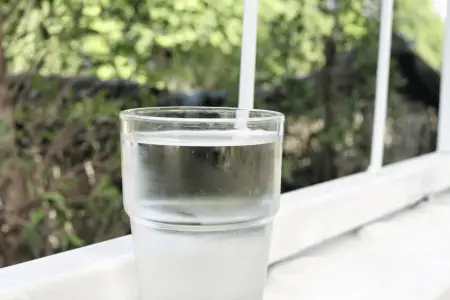Are you noticing your water is lathering or your skin is dry or itchy? This could be a tell-tale sign that your water softener isn’t working.
The easiest way to see if your water softener is working is to see if your soap bubbles and lathers. It doesn’t matter if the water is hot or cold, just wash your hands with soap and see if bubbles form. If they don’t, it’s a strong indication that you have hard water.
But don’t worry, in this article we’ll reveal more tests to confirm if your water softener is working. And if it’s not, we’ll give some tips on how to fix your problem.
So let’s get right to it!
Signs Your Water Softener isn’t Working
There are a couple of clear signs your water softener isn’t working, including the occurrence of dry and itchy skin and a salty taste to your water. Here are the most common signs your water softener isn’t working.
Dry and Itchy Skin
One of the best ways you can know that your water softener isn’t working is that you will have dry, itchy skin after taking a shower. The reason for this is because of the calcium and magnesium deposits that are present in hard water. These minerals cause itching and dry skin after the water has dried up, and all that’s left behind is calcium and magnesium.
If you feel itchy after getting out of the shower or notice that your skin is drier than usual, it may be because your water softener is malfunctioning. Additionally, if you don’t have a water softener but suffer from dry, itchy skin, investing in a softener may be just the ticket for you.
Water Lathering
Lathering is when a bar of soap gets wet and results in bubbling and suddy run-off from the wet soap. If you have soft water, you’ll notice lots of water lathering when you take a shower or wash your hands. However, if your water is too hard, your soap will lather very little or not at all.
If you suspect that your water softener isn’t working and don’t feel like calling a plumber just yet, this is a suitable, free method to test things out. It may be that your softener simply failed to regenerate, and you must force one manually. However, it could also mean that your softener is no longer working, and it’s time to replace it.
Salty Water Taste
If you begin to notice that your water tastes saltier than usual, it could signify that your water softener isn’t working correctly. Your water softener utilizes salt on the inside of its tank to help soften and purify water, but your water shouldn’t reflect that in the way it tastes.
Salty-tasting water could simply be an indicator of a bad valve within the softener system, but it could mean something more serious. You should first replace the salt within your softener and see if this clears things up. If it does, great! If not, however, it may be time to call a plumbing professional and let them diagnose the problem.
Reduced or Lost Water Pressure
A loss in water pressure is often because of a clogged water pipe in your plumbing system. Water pipe clogs shouldn’t occur except for sediment and mineral buildup. Your water pipes are closed off to the outside, which means that a clog can only happen from the inside.
If you notice a loss in water pressure, this means that your water softener isn’t doing its job, and minerals have seeped through to the point of piling up inside your pipes. The odds are that the same thing is happening to your water heater, which can result in hundreds or even thousands of dollars in repair bills.
When you notice a drop in water pressure, the first thing you should do is contact a plumbing professional and let them test your system. If there is an external problem to blame, they will find out.
How To Test If Your Water Softener is Working
Now that you know what to look for to know that your water softener might not be working, let’s look at a few tests you can conduct to get concrete answers. If you perform these tests and the results indicate that your water softener isn’t working, we’ll advise you on what your next steps should be.
Soap Test for Water Softener
Soft water will cause a bar of soap to lather and have suds. Hard water, on the other hand, will not. Here is how to conduct the soap test to see if your water softener is working.
- Take a bar of soap in your hands and hold it under a kitchen or bathroom faucet.
- Plug the sink so that water won’t drain away.
- Turn on the faucet and let water run over the bar of soap in your hand. The water temperature doesn’t matter, as both the hot and cold sides should give off soft water.
- If you notice that the water is lathering after making contact with the bar of soap, your softener is working correctly.
- If you notice that there are no suds or lathering, it could mean that your softener isn’t regenerating or has given out altogether.
The soap test is a very cheap and mostly accurate way of testing your water. This test will give you a good idea of what’s going on, but you should conduct a more surefire test before jumping to conclusions.
Water Hardness Test Kit
The water hardness test kit is a test that professional plumbers will use to test the hardness level of your water. The good news is that it’s something you can do on your own as well! Let’s take a look at how to locate and use a water hardness test kit.
- The first step is to purchase a water hardness test kit.
- Remove one of the test strips from its bottle and grip it tightly, so you don’t lose it under the flow of rushing water.
- Turn the cold water on at a kitchen or bathroom faucet and let it run for 10 seconds.
- Quickly, hold the test strip under the water for just 1 second and remove it immediately.
- Compare the color on the test strip to the color chart on the side of your test kit. Test kits might have different color scales, so make sure you only compare a test strip to the container that it came from.
- A bottle or box usually comes with at least 20 to 50 test strips, so you can conduct the test several times to be sure about the results.
- Based on what your test strip tells you, you should be able to know if your water softener is working or not.
- COMPREHENSIVE WATER ANALYSIS: The Varify 17 in 1 Premium Drinking Water...
- PRECISION AND RELIABILITY: Accuracy is paramount when testing drinking...
- EASY TO USE: Advanced testing need not be complicated. The Varify kit comes...
- EXTENSIVE TESTING CAPABILITIES: The Varify test kit is designed to assess a...
- CONTRIBUTE TO A GREATER CAUSE: Not only does the Varify test kit provide...
This test is one that a plumbing professional will utilize when checking your water system. Conducting it beforehand will give you a good idea about whether or not you need to call a plumber to conduct further testing.
Between this test and the soap test, you should be able to determine the status of your water softener.
FAQ
What makes water hard or soft?
Part of the reason water is hard is that it is full of minerals such as calcium and magnesium. These minerals aren’t going to kill you, but they cause your water to be discolored and turn a brownish yellowish color. This nasty water will stain your toilets, sinks, showers, and anything else that your water touches.
Because of the composition of hard water, it will damage your water heater by causing the bottom of the tank to fill with mineral deposits. These deposits will result in your water heater malfunctioning and giving out much sooner than it’s supposed to. Making sure that your water heater is working could save you big money in the long run.
What happens when my water heater doesn’t regenerate properly?
Calcium and magnesium will sneak through and into your water heater and pipes if your water softener doesn’t regenerate. This could cause your pipes to clog and your water heater to give out years before it should.
How often do water softeners regenerate?
Most modern water softeners regenerate on their own based on internal sensors. These sensors may cause regeneration once a week, every other week, or as often as is needed. If your water is hard enough, it could result in regeneration several times a week.
How often your water softener regenerates depends on the hardness of your water and how much water you use. The more water you use, the more your softener will have to regenerate.
Conclusion
You now know how to test if your water softener is working or not. Conduct the soap test and use a water hardness test kit to ensure your water softener is actually softening water.
Check to see whether or not your softener is regenerating when it’s supposed to and if it’s regenerating correctly. It may be that you simply need to replace a timer or put new salt into your brine tank.
These are often simple repairs, but the problem could be something more complicated that requires the skills of a professional plumber. The last thing you want is hard water to clog your pipes, ruin your water heater, and make your water dirty or discolored.

Nick Lopresti is the founder of YourH2Home and a home improvement expert. He has years of experience writing about various home improvement topics, mostly as it pertains to water systems.

